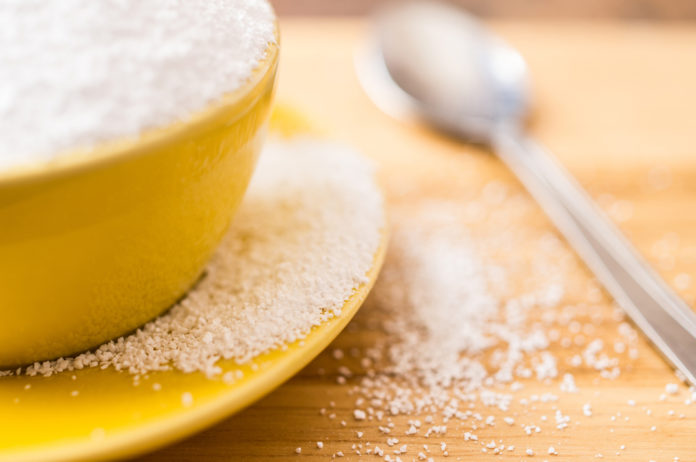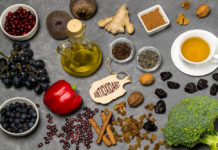8 Scary Food Additives
1. Trans Fat
Unlike popular belief, fat is not always the bad guy… But it is important to note “always,” as trans fat unveils a different persona… Compared to healthy monounsaturated and polyunsaturated fatty acids, trans fats have been shown to trigger inflammation within the body and raise the risk of heart disease. In fact, the fat has been so concerning, the Food and Drug Administration (FDA) coined the year 2018 for its removal from the food supply. But until trans fat is dwindled from food products, steer clear of hydrogenated vegetable oils and the foods they comprise, including margarines, sweet treats, fried foods, and chips.
2. High Fructose Corn Syrup
As the name suggests, high fructose corn syrup (HFCS) is a sweetener made from yellow corn. It begins as corn starch and converted into glucose and fructose after the addition of enzymes. Although fructose is commonly found in fruits, there are distinct separations from a fresh piece of fruit and fruit snacks sweetened with HFCS, including few vitamins and minerals, no phytochemicals, fiber, antioxidants, or satiety from the snacks. HFCS is also almost as sweet as sugar, holds the same caloric value as sugar and honey with four calories per gram, and prolongs the shelf life of a product and provides a chewier, moist texture. And while individuals may believe HFCS is a healthier alternative to sugar, the bottom line is this: Sugar is sugar and too much of it can cause weight gain, and lead to diabetes, cardiovascular disease, and other other illnesses.
3. Mono-Sodium Glutamate (MSG)
Formally known as mono-sodium glutamate, MSG is a flavor-enhancer and preservative often used in Chinese dishes and added to many packaged and canned foods, potato chips, soups, and canned meats. Unfortunately for consumers, it is not always listed as MSG and can be disguised as “natural flavoring” or “glutamic acid” on the food label. MSG has been concerned to promote, grow, and spread cancer cells, while also being linked to obesity and cause of inflammation in the body. And related to its inflammatory effects, individuals living with arthritis may experience more intense symptoms following the intake of MSG.
4. Butylated Hydroxyanisole
Butylated hydroxyanisole (BHA) is a preservative used to slow down the rancidity of fat and often found in cereals, chips, and other products using vegetable oil. According to a National Toxicology Program report, sufficient evidence suggests BHA may be carcinogenic, or cancer-causing.
5. Olestra
Also known as Olean, Olestra made its claim to fame during the low-fat craze, offering fat-fearing individuals the opportunity to relish on a variety of low-fat and fat-free products. Olestra is a fat substitute, possessing zero calories and cannot be absorbed by the digestive system. While it sounds like a worthy food additive, its inability to be absorbed has sparked numerous reports of abdominal cramping and diarrhea. Interestingly, too, evolving research encourages individuals to not fear fat, as its intake may assist in weight loss and diabetes management. Aside from digestive troubles, olestra may interfere with the body’s absorption of phytochemicals (beneficial compounds found in plants) such as lutein, lycopene and beta-carotene, all of which help protect the body from cancer and heart disease.
6. Food Dyes
Though food dyes and colorings work to enhance the appeal of various food products, they essentially offer no nutritional value or benefit to the body and may actually be harmful to health. In fact, Red 40 and Yellow 5 and 6 have shown to be carcinogenic in animals, while some reports suggest they may cause hyperactivity in children and allergic reactions in some individuals. Nutrition experts encourage to eat the rainbow by consuming plants colorful in nature. For more information on food dyes, here is what you need to know.
7. Artificial Sweeteners
While individuals have used artificial sweeteners and sugar substitutes to cut calories and manage blood sugars, ongoing research highlights some not-so-sweet health concerns. Their addition in diet soda may lead to weight gain, increase blood sugar levels, and lead to metabolic syndrome. Additionally, they may cause unpleasant gastrointestinal symptoms while aspartame may trigger an inflammatory response within the body and cause migraines. To fulfill that sweet tooth when ridding refined carbs and desserts, choose naturally sweetened fruits that satisfy that sweet tooth while increasing fiber and nutrient intake.
8. Potassium Sorbate
Dissimilar to the mineral and electrolyte naturally found in bananas, potassium sorbate is a chemical additive widely used as a preservative in foods, drinks, and cosmetics. It grew interest in the food world when it inhibited bacteria and mold, thus making its way onto shelves. And while the FDA recognizes it as safe, surfacing evidence suggests potassium sorbate may compromise our DNA while some people have reported allergic reactions to it, particularly when applied in the form of a personal hair or skin-care product.
Ultimately, speaking on all food additives and preservatives, aim to choose wholesome foods, as they offer the greatest benefits to health by supplying the body with essential nutrients.









